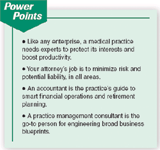Article
3 advisers every practice needs
Author(s):
Who's got your back, why you need them, and where to find them.
Whether you're a solo physician or belong to a group, your practice needs a team of experts on call. A small but crucial advisory group consisting of an attorney, an accountant, and a practice management consultant will help to ensure that your business is run in a productive, cost-effective fashion.
"A physician needs smart, talented people to whom he can turn for advice on a regular or even an occasional basis," says Kenneth Hertz, a consultant with the Medical Group Management Association who's based in Alexandria, LA. "Key positions like an attorney and an accountant are an ever-present part of your playbook, whereas a practice management consultant will only be needed now and then for an acute situation, like the 'closer' in baseball who comes in to get that final out."
So who's got your back? Do you have people you can rely on to help make sure you're running the best, most profitable practice possible? If not, here's what to look for when putting together your winning advisory team:
When you think of the word "lawyer," what comes instantly to mind? (Now, now, be nice.) Most physicians will answer "malpractice." But a malpractice expert really isn't what you need on a day-to-day basis. There are a host of other issues you'll need legal counsel on-in advance.

A healthcare attorney will negotiate and formalize your hospital and managed care contracts, as well as shareholder and partnership agreements, noncompetition clauses, and issues of buyouts and succession, Hochman explains. Remember: It's what you don't know that can hurt you. A prime example of ignorance that could result in legal calamities is in the area of physician-employees. "You need to set out in writing such matters as how an individual will be compensated, how termination, malpractice coverage, and ownership of medical records will be handled, etc.," says Hochman. "These are areas in which you don't want to rely on oral arrangements and a handshake."
"If you've seen one agreement, you've seen one agreement," adds Hochman, to illustrate how greatly contracts vary and how important it is to have keen counsel.
A healthcare attorney can also help guide you through the jungle of regulations that cover areas such as Medicare billing and self-referral and antikickback rules. "Physicians who have started to include ancillary services commonly call lawyers these days to make sure that they're complying with Stark regulations," says Hochman. "Sage advice is required any time you add an ancillary service or establish a joint venture, or if you contract with an outside facility, vendor, or another physician, which may involve referrals or a discounted fee (and be seen as inducement to refer)." A vigilant health lawyer stays on top of the ever-changing guidelines and tracks advisory opinions, alerts, and press releases to see that you don't stray afield of what's permissible.





